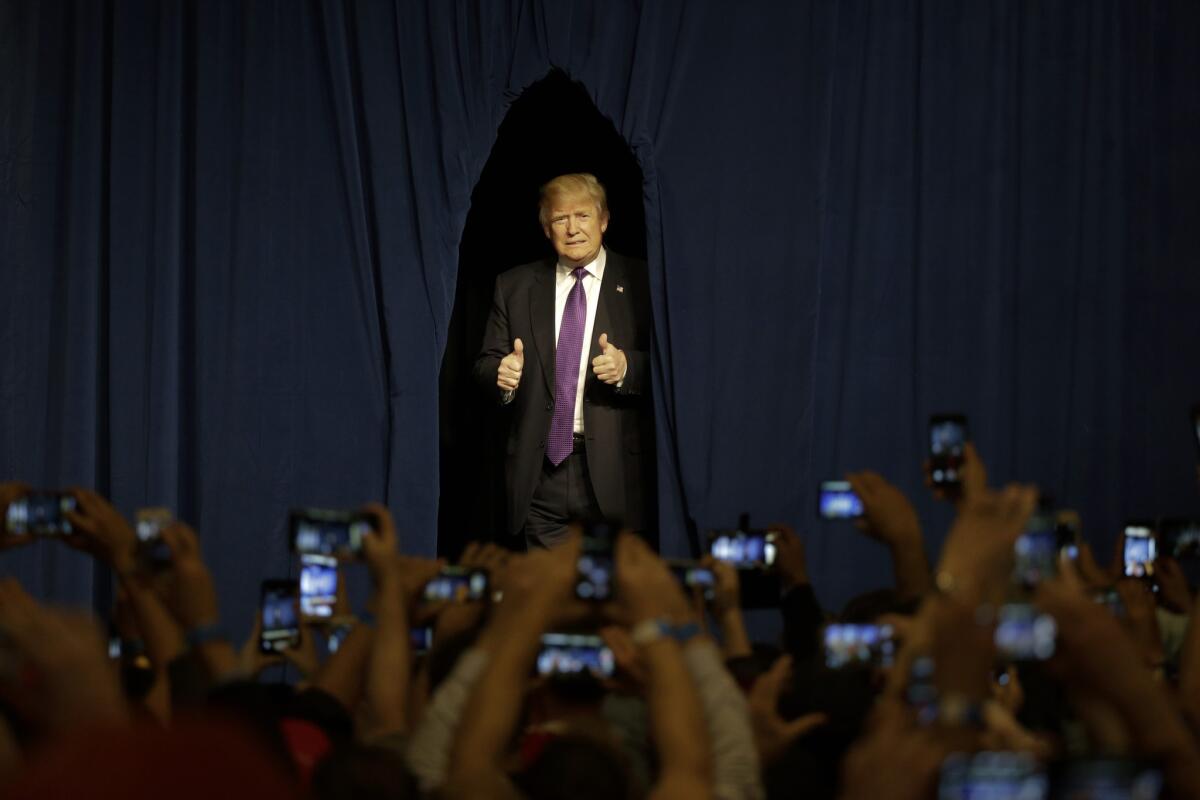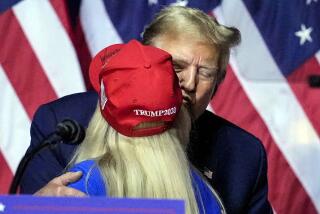Republican elite are shifting their thinking on Donald Trump: ‘You know, this could happen’

Republican presidential candidate Donald Trump arrives for a caucus night rally Tuesday in Las Vegas.
Republican leaders who view Donald Trump as a pox on their party have finally settled on a strategy: Resist him as long as they can. Then figure out how to retreat gracefully.
Most mainstream Republicans still worry that Trump would make a bad president. And they hold deep concerns that his incendiary rhetoric and ideological smorgasbord of ideas could damage the party, both politically and philosophically, so profoundly that it might never recover.
But even as many party elites have fallen in line behind Florida Sen. Marco Rubio in recent days — believing him the best hope to defeat Trump — they no longer dismiss the billionaire celebrity or insist that it will all work out, as it usually does for the establishment in GOP primaries.
“A lot of longtime Republicans, probably a couple weeks ago, had to sit down and think, ‘You know, this could happen,’ ” said Trent Lott, the former Senate majority leader from Mississippi who is now a Washington lobbyist.
TRAIL GUIDE: All the latest news on the 2016 presidential campaign >>
For many in the party establishment, that reckoning amounted to an existential crisis, a moment to reflect on where their core beliefs end and where their practical political instincts kick in.
If Trump wins the nomination, his combative relationship with the establishment will end in an embrace, though perhaps an uneasy one, predicted Lott, who is backing Ohio Gov. John Kasich.
“They’re not going to sign up, and they’re not excited by the prospect,” Lott said of his fellow party standard-bearers. “But I think they’re thinking that if he becomes the nominee — he runs the table and becomes the nominee — we’re certainly going to support him if it comes to Hillary or Bernie.”
It’s a slow process. Several establishment figures, including former New York Mayor Rudolph Giuliani and Reagan administration Secretary of Education William Bennett, said in recent days that Trump has reached out to them to talk policy, sending a broader signal that he may be able to win over at least a few establishment allies. And others have sounded notes of increasing acceptance.
“Oh, yeah, I think I can work with Donald Trump,” Rep. Kevin McCarthy, the House Majority leader from Bakersfield, told MSNBC this week, giving Trump a 50% chance of grabbing the nomination.
Rep. Duncan Hunter, an Alpine Republican, told Politico on Wednesday that he was supporting Trump, becoming the first member of Congress to endorse him.
At the same time, the anti-Trump forces remain divided over how to confront Trump — whether to attack him head-on now, or wait until the field winnows so that a single candidate can take him on. Many of the GOP’s traditional mega-donors, including casino magnate Sheldon Adelson and the Koch brothers, have not spent money in the primaries, neither to support a candidate nor to try to take down Trump.
Rubio’s supporters have pressed Kasich to withdraw. Kasich, who believes his support will increase in a few weeks when contests move to the Midwest, has resisted. Texas Sen. Ted Cruz, the only candidate to defeat Trump in a nominating contest, also has asserted that he is the best candidate to beat Trump, though his campaign is troubled and many in the GOP establishment view him with equal or greater disdain. Ben Carson, the retired neurosurgeon, is also keeping the field relatively crowded, even though he has little chance of winning.
TRAIL GUIDE: All the latest news on the 2016 presidential campaign >>
That dynamic helps Trump, who has solid support from about one-third of Republican primary voters. Trump has now decisively won contests in New England, the South and the West, while placing second in the Midwest.
But many party leaders and donors still want to wait until at least mid-March, when larger winner-take-all states such as Florida and Ohio vote, before resigning themselves to a Trump nomination.
“I don’t think you’re going to see a lot of folks accepting the inevitable until we get through the heavy delegate states and the math starts to harden,” said Josh Holmes, former chief of staff to Majority Leader Mitch McConnell and president of Cavalry, a consulting firm. “We’re just not there yet.”
One of Rubio’s Washington-based financial backers explained the Machiavellian political calculus a little more bluntly.
“There’s plenty of time to make nice with Trump,” he said, requesting anonymity to speak candidly about the thinking among elite Republicans. “But you don’t need to do that now, when there’s time to take him out.”
Some leading figures on the right insist there is no conscionable time to join the Trump bandwagon, citing Trump’s inconsistencies on issues including abortion, his nativist rhetoric or his rebuke of other principles that have come to define the modern conservatism.
“Those who are deluding themselves thinking that if they support Trump, he will support them, will instead find themselves slowly compromised on both their integrity and values,” commentator Erick Erickson wrote this week in an essay titled “I Will Not Vote For Donald Trump. Ever.”
Waiting almost certainly plays to Trump’s advantage. He not only likely wins if the field remains crowded, he may also win a one-on-one competition. After coming first in the South Carolina primary and the Nevada caucuses this week, Trump mocked pundits for saying his GOP opponents’ votes combined could defeat him if some of them would drop out.
“They keep forgetting that when people drop out, we’re going to get a lot of votes,” Trump told supporters at his Tuesday celebration at the Treasure Island casino.
Polls seem to back him up, with increasing numbers of Republicans saying they could accept Trump as their nominee. That has some Republicans arguing that the establishment should not go down without a more robust fight. They throw their hands up in frustration as they see Cruz, Kasich, Carson and Rubio fending off attacks from one another instead of focusing on Trump with their campaigning and advertising dollars.
“It’s looking at the Daytona 500 and saying ‘You know, if there hadn’t been X, Y and Z cars in the race, I could have won,’ ” said Stuart Stevens, a former campaign advisor to Mitt Romney. “You race the field. You have to beat the person in front.”
That may be the case, but most candidates have shied from taking on Trump consistently, considering those fights have generally ended with Trump’s opponent on the mat.
And many party elites already have accelerated the process of coming to terms with a Trump nomination. Ron Kaufman, a former Romney advisor who backed former Florida Gov. Jeb Bush until he dropped out Saturday, said he still would prefer a more centrist conservative candidate. But, he said, he believes Trump will not seem so absurd as time moves on. In the 1980 Republican primary, Kaufman supported George H.W. Bush against a Hollywood actor.
“I remember saying ‘God help us if Ronald Reagan is president,’ and a lot of people felt that way,” he said.
Twitter: @noahbierman
MORE ON CAMPAIGN 2016
Marco Rubio’s no-win Republican primary strategy can’t last
The prospect of a Trump-Rubio rumble and 3 other things to watch for in the GOP debate
While Clinton talks race, Sanders turns elsewhere to reach minority voters
More to Read
Get the L.A. Times Politics newsletter
Deeply reported insights into legislation, politics and policy from Sacramento, Washington and beyond. In your inbox three times per week.
You may occasionally receive promotional content from the Los Angeles Times.







